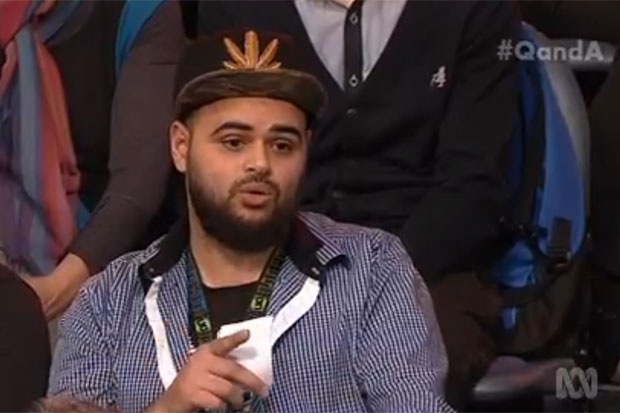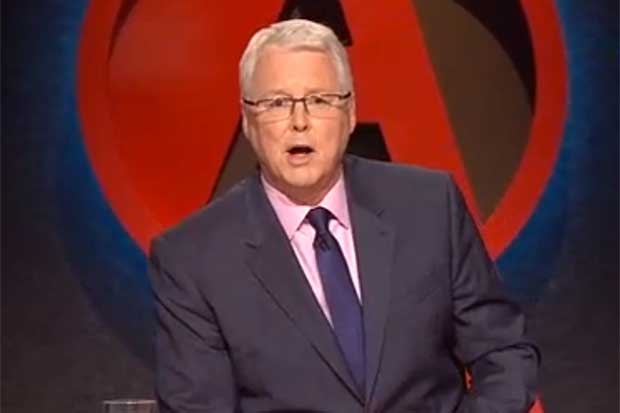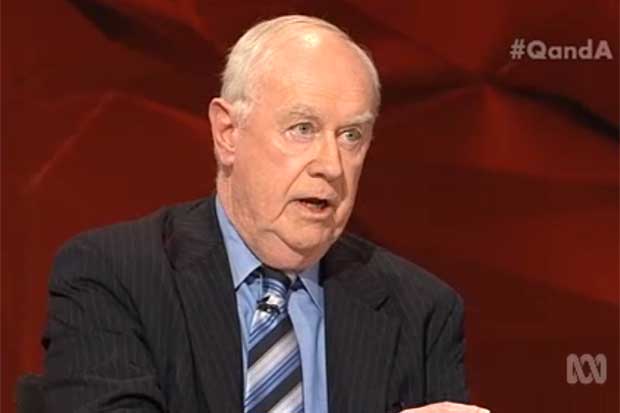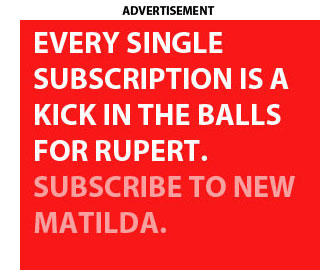Generally speaking, I don’t agree with conservatives. They wreck stuff, like forests, human rights and countries. In particular they wreck progress, and stand in the way of all the major issues that history looks back upon and tut-tuts.
Having said that, one of my favourite quotes of all time – and the biggest lesson I’ve ever learned in journalism – comes from a conservative American journalist named PJ O’Rourke.
I’m butchering the anecdote a bit (it was a long time ago and I can’t find it online) but O’Rourke was writing about coverage in a university student newspaper, which breathlessly recorded that as many as 300 students had turned out to a protest on some left-wing issue.
O’Rourke acknowledges the excitement of the paper at the turnout, then notes that the headline could equally have read, “14,700 students stay home, get drunk, eat pizza and have sex”.
The point being, media is always subjective. Every day, we make decisions about what is and what isn’t news. And in the case of this article, we make decisions about to whom we give a voice, and whom we ignore.
Welcome to the festering sore on the buttocks of rational society that is the Zaky Mallah scandal. And I have some bad news. This story is not a defence of the ABC any more than it's a defence of News Corporation, and all the conservative commentators from central casting.

In this particular case, I think they all stink. About the only person who doesn’t come out of this story looking any shittier is Tony Abbott, and that’s because he’s coming off an impossibly low base.
After a week of fever pitch debate, punctuated by foaming rants from conservative politicians and commentators, Q&A broadcasting resumed last night, only for them to try and pull off exactly the same sort of stunt that got them here in the first place. And everyone appears to have missed it.
Tony Jones opened the show with an uncharacteristically nervous monologue. After acknowledging the furore, Jones offered this: “As we go to air tonight there is more than one inquiry underway. It’s clear therefore that the issue will come up for discussion tonight and we’ll do our best to handle that in the same way we would any other issue. Others can and will no doubt judge this program and the ABC, and my role tonight is not to pre-empt that or put any particular view.”
That was followed by Jones spending the rest of the program pre-empting and putting his particular view. But you wouldn’t expect him to do otherwise – Q&A was under assault, and he’s the host.
Jones continued: “But it is appropriate to put a few facts on the record… the Q&A team were not aware at the time Zaky Mallah appeared of the very offensive, misogynistic tweet that he put out about two female journalists. Had we known we would have rejected his participation.”
Well, maybe. We’ll come back to that, because it’s a very important part of the new excuse Q&A seemed to advance last night. An excuse on which they were challenged by guest Paul Kelly, to whom we will also return shortly.
Because before we do, I just wanted to get in a free shot at Tim Wilson, the ‘Freedom Commissioner’ who weighed in last night with some of the best comedy the ABC is likely to produce all year.
If you haven’t watched Wilson die in a ditch for his conservative bedfellows before, I thoroughly recommend it. On Mallah last night, he said this: “No-one is calling for this individual to be silenced or censored. No-one has called for that.”
Which is of course rubbish. Many, many people have – and continue to – call for precisely that, as Jones pointed out immediately to Wilson: “Just a qualifying point, I think the minister on the night did say he would quite like to see him deported.”
“He did. But that does not silence or censor him,” replied Wilson, to hearty laughter from the audience.
I think I speak on behalf of all of Team Australia when I say, ‘Shut up, Tim Wilson’.
Anyway, back to Tony Jones and Paul Kelly.
Kelly was brought on to replace one of the two conservative voices who boycotted the show – Alan Tudge and Nick Carter from Menzies Research. At least that’s what Q&A would have you believe.
But if you watched the show, it’s clear Q&A had another goal in mind, and they set it up nicely by asking Kelly his view about Mallah’s appearance. Kelly took the bait.
“Media organisations have got to be very careful about who they put up in lights, about who they give a platform too,” said Kelly. “And it would have been possible to have a lot of other Muslims in the audience, raising these sorts of issues. The ABC chose not to do that.
“I find it extraordinary that we’re being told today that he would not have been asked on the program if people had known what he said in terms of his sexist and misogynist past, and the threats he’d made about female journalists.
“We’re told that that would have ruled him out of the program. But the fact that he had been prosecuted [for]terrorism; the fact that he had admitted that he threatened Australian officials and wanted to kill them; the fact that he’d served time and that he had a weapons arsenal; that he was conducting a campaign to publicize jihad, nonetheless, that’s okay.
“Well it’s not okay. It’s not okay in terms of the ABC taking a decision about who is going to appear on Q&A and who is going to confront a government minister about citizenship policy.”
Jones had let it go long enough. He sprung the trap.
“Well, can I just interrupt you there. Back in 2012 September your own paper ran a story about Mallah, headlined, ‘Rebel urges Muslims to wage a Jihad of peace.’ I imagine you’re aware of the content of that story?’”
“I’m aware of that story,” responded Kelly, “But that story, that story, is a separate issue from giving him a platform, giving him a platform on this program.”
Well, not really all that separate, Paul. Tony Jones has a point. Sort of.
And so Jones interrupts: “The story in your paper said his experience going to Syria had showed that hate and violence were self-defeating. ‘The more you fight the more you lose,’ says Mallah in the story. ‘The more you have hatred, this anger, the more you feel victimized.’ Now would it have been wrong of the program makers to take that into account when forming a judgement about him?”
Gotcha, Paul Kelly. Booyah. Take that! Your paper wrote a story about Zaky Mallah where he said a whole lot of nice stuff, and we read that story before we invited him on, and that’s why we didn’t realize he was a nutbag!
Except that Q&A left out some pretty important information. And this is where things get awkward for everyone.

As of midnight last night, there had been 473 print or online stories, comments and letters published on Zaky Mallah since 2005, when he first came to public prominence after being falsely accused of planning a terrorist act.
Of those stories, 339 were written in the past week, after his appearance on Q&A. That still leaves 134 stories written before he became ‘media persona non grata’. Clearly, news organisations have found something quite compelling about Mallah for some time. A decade, in fact.
Would anyone like to guess which major media organisation published the least stories on Mallah before his Q&A appearance? The ABC, with 12 stories.
Fairfax came in next, with 24, followed closely by AAP, with 30.
I think you can see where this is heading… the news outlet that gave the most prominence to the views of Zaky Mallah prior to his appearance on Q&A was none other than News Corporation, with a total of 40 stories.
Indeed, during one period – May 2011 to January 2013 – a total of 12 news stories were published on Mallah, and every single one of them was by a News Corporation outlet.
And can you guess which News Corp masthead published the most stories about Mallah?
The Australian, with 17 – almost half the News Corp total.
If we leave things there, it looks great for Tony Jones and Q&A, and not so flash for News Corp or Paul Kelly. But it begs the question, if this information is so easily obtainable by a simple search of media clips, why didn’t Tony Jones dump all of it in Paul Kelly’s lap on live television? Why simply point to a single article?
The answer is simple: Jones and Q&A would have had to concede that they read all the other stories published about Mallah – in particular by the Oz – and that would have mean conceding that the Mallah story about a ‘Jihad of peace’ was the exception to the rule. And it would have rendered their excuse about the Mallah tweets as utterly facile.
For the record, the ‘Jihad of peace’ story was written way back in September 2012. Here’s Mallah three weeks later, still in The Oz, in a piece written by Stuart Rintoul about Australian kickboxer, Roger Abbas, who was killed in Syria:
Mr Mallah, 29, now a criminology student at Murdoch University, followed with his own statement, saying on Facebook: "We ask Allah to raise the rank of this brother – this Martyr to the highest position in Paradise.
"For the many brothers heading up to Syria in the weeks to come, go and don't look back. A bullet of a sniper is a ticket to paradise."
Here’s another quote from Mallah in The Australian, in a piece written by Pia Akerman, on January 3, 2013:
“There is a high chance that you will die. If that means death, then so be it. To die as a martyr is a great thing in our religion.”
And here’s a quote in The Oz from December 11, 2013 in a piece written by Ean Higgins, under the headline ‘Muslim’s ‘Jihad’ for passport:
“I hate society, and I hate the whole world.”
And that’s just the coverage in The Australian. Here’s the opening paragraphs from a piece from the Sydney Morning Herald on July 1, 2013, in a story headlined ‘Call me crazy but this is a cause I am willing to die for’:
“Zaky Mallah's aim is to die in Syria.
"I wouldn't mind being granted martyrdom," he said. "Call me crazy, call me weird, call me whatever but it's a cause I'm willing to die for."
It ran alongside a story helping him recruit for the Free Syrian Army:
“Zaky Mallah, who runs an office for the Free Syrian Army from his Parramatta garage, promises he can get young Australians into Syria in less than 24 hours but strongly denies he is recruiting people for the resistance.
"I encourage Australians to go to Syria not to fight but to see the situation for themselves," Mr Mallah said. "What they do after that is up to them."
To give you some idea of the depth of Mallah’s confusion – or perhaps just his lack of intelligence – and the media’s eagerness to exploit it, here’s a quote from a Courier Mail article on November 13, 2013, in which Mallah both condemns and promotes martyrdom in a single paragraph: “I don't encourage anyone to go to Syria and fight – especially not to blow themselves up. I was shocked that an Australian man has gone to that extent. On the other hand, I am pro-revolution and I say, well done."
All of this, of course, is far worse than what Mallah said on Q&A last week, and it sheds new light on the depth of hypocrisy of News Corporation mastheads, who led their own Jihad against the ABC last week. But are we seriously supposed to believe that the Q&A ‘program makers’, as Jones calls them, were blissfully unaware that Zaky Mallah was unreliable at best, and, at worst, a sandwich short of a hamper?
And when he turned up for the filming wearing a marijuana cap, still no alarm bells rang?
News Corp might have the monopoly on hypocrisy all sewn up, but Jones and Q&A are in a league of their own in the bad spin department.
Here’s something else Paul Kelly said last night about Mallah’s appearance: “He was on the program not to have a proper debate about [citizenship]. This was a gotcha moment, this was a tabloid gotcha moment. He was picked out to embarrass the government on this issue.”
Kelly is bang on, that’s precisely why Mallah was there. But ironically, Kelly was on last night for precisely the same reason. Old habits at the ABC die hard.

Randa Abdel-Fattah, a moderate and powerful Muslim voice writing in New Matilda last week, was 100 per cent correct when she expressed her frustration that putting up someone like Mallah was irresponsible. That was a view expressed by others, including Paul Kelly, Tim Wilson, and Malcolm Turnbull.
Equally, by using someone like Mallah to trap a government official – notwithstanding the stupidity of Steve Ciobo's response – the ABC have missed an opportunity for an important debate, and paved the way for the further demonization of the Muslim community.
The debate about the de-radicalisation of Muslim youth is an important and nuanced one. So too is the broader debate about how Muslims are publicly portrayed in an era where government and media are trying to ramp up the fear.
The ABC did harm to that debate, and now they’re trying to hide behind the hypocrisy of a media company whose business model is deceit and profiting from misfortune and ignorance. That’s deeply unedifying.
While we expect hypocrisy from News Corp, we can choose to pay for their product, or not. But the ABC is our national broadcaster. Unless we avoid tax, we don’t get a choice about paying for their service, and ham-fisted ‘gotcha’ moments followed by crappy spin shouldn’t be part of the bill.
We set high standards for the ABC, and necessarily so. Some of the nation’s best journalists work there, and clearly some of the best journalism emanates from there. While the merits of the decision to include Mallah on the show can be debated for eternity, the ABC’s attempt to deflect and defend it was disgraceful.
As is so often the case, it’s the cover-up, not the original act that causes you the most grief.
So what can we learn from all this?
Firstly, we learn that while the ABC is routinely very good, it can occasionally be very disappointing, particularly when it comes to confronting its own errors. This story is a case in point.
Secondly, we also learn that the broader media’s primary focus is not what’s important. It’s about what rates, and oftentimes, what rates is not important… which sums up this whole ridiculous farce better than anything.
Finally, we learn that this whole saga is actually about the symbiotic relationship between media and politicians, to the exclusion of all other interests.
It’s about a Prime Minister, down in the polls, who wants us talking about terrorism, because the more we do, the more frightened we get, the easier we are to manipulate and the more likely he is to get re-elected. And bugger the harm he’s doing to the country he says he loves in the process.
It’s about a media outlet – News Corporation – that also wants you talking about terrorism, because the more scared you are, the more media you consume, and the more likely you are to vote conservative.
It’s about a broader mainstream media that jumps on for the ride, because why the hell not? The economics are good, and everyone else is doing it, right?
And it’s about a national broadcaster that will, occasionally, sink to the level of commercial media and prioritise sensationalism and ‘gotcha journalism’ over the things that really matter. The ABC might not be trying to make money, but it is often as driven by ego and ratings as News Corporation is by profit.
Tony Abbott may be a feckless idiot trying to wedge the nation on terrorism, but he can’t do it without the aid and comfort of the Australian media, and on that front he has many willing allies.
The last word belongs to Paul Kelly, who last night summed up better than I can what the ABC needs to do to put this issue behind it.
“I think it's a mistake for the ABC to close ranks, defend the program, live by a tokenistic apology and not take any substantive follow up action.
“… I think this is a question of leadership of the ABC. It goes to the managing director, it goes to the chairman and it goes to the board.
“Now, these aren't just my views, these are very widespread views. I support the ABC, I want to see a strong, vibrant, independent, impartial ABC.
“This concept is in real trouble at the moment and if the leadership of the ABC is not savvy enough and smart enough to realise this and recognise that it's got to take some serious decisions about this issue then that's going to be, I think, a very disappointing outcome for everybody.”
Now that’s a gotcha, ABC.
* New Matilda is an independent Australian media outlet. We rely primarily on subscription to subscribe. You can help us make a difference here.
Donate To New Matilda
New Matilda is a small, independent media outlet. We survive through reader contributions, and never losing a lawsuit. If you got something from this article, giving something back helps us to continue speaking truth to power. Every little bit counts.






